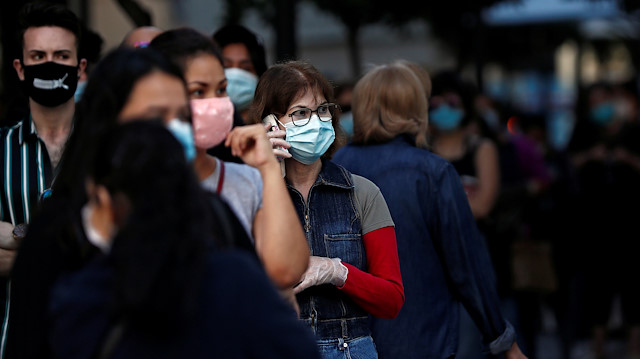
Spain saw daily COVID-19 cases double two days in a row this week, but the country’s chief epidemiologist said the outbreaks are under control.
According to the last available data point from the Health Ministry on Wednesday, diagnoses plateaued at 156.
Still, the number of cases during the week -- 2,016 -- remains slightly below the same number a week ago -- 2,276 -- with just a small fraction of Spain’s tally of over 242,700 confirmed infections.
“Overall, we’re in a favorable situation. Cases are going down, and risk is very low in many regions. However, we are still identifying small, controlled outbreaks in concrete places. And if these outbreaks are not controlled correctly, they could cause a new resurgence,” said Fernando Simon, Spain’s chief epidemiologist, in a press conference on Wednesday.
He said Spain has been successful at early detection, tracing and isolation and expects cases to continue going down for the next couple of months.
Three of the main outbreaks this week occurred in hospitals in the Basque Country. The surge in cases caused neighboring regions to pull the brakes on a plan to open up a northern mobility corridor.
“We need to move forward in the safest conditions possible,” Melania Alvarez, the spokesperson of the Asturias region -- which decided to keep borders closed with the Basque Country -- said in a press conference on Thursday. “Second waves aren’t science fiction -- they are very much a reality.”
- Could mandatory masks prevent post-lockdown spike?
Still, in the last week, Madrid and Catalonia, two of the hardest-hit regions, have been home to over half of the country's new cases. On Monday, the regions allowed indoor restaurants, bars and cinemas to begin operating.
Much of the rest of the country has gone even a step further and allowed nightclubs to open.
Mobility, however, remains limited, with most people not being able to leave their region -- making the outbreaks easier to track and contain for now.
But by June 21, when Spain's state of emergency is set to expire, the entire country could be in the scenario of “new normality” which means a full opening of mobility, services and activities, but with built-in social distancing and extra hygiene measures.
Spain will also continue to make masks mandatory in situations where less than five feet of distance between people is not guaranteed until an effective vaccine or treatment is available. This could also give Spain an advantage in controlling a second wave.
According to a model published in the British Royal Society on Wednesday, widespread face mask use could significantly reduce the rate of COVID-19 spread, prevent further disease waves and allow less stringent lockdown regimes.
“The effect is greatest when 100% of the public wear facemasks,” the paper found.
However, the World Health Organization, emphasizes that the use of masks alone will not make a population invincible.
"Whether or not masks are used, compliance with hand hygiene, physical distancing and other infection prevention and control measures are critical to prevent human-to human transmission of COVID-19," says the organization in its latest advice on the use of masks.
- Tourism paradox
Besides having to contend with the pandemic amidst eased restrictions, chief epidemiologist Fernando Simon suggests that Spain’s biggest threat could come from imported cases.
On Wednesday, he said 24 cases came in from abroad in the last week and nearly 100 importations occurred since May 11. Although travel is extremely limited at the moment, the majority of cases came from the US and South America.
“This number will continue increasing once our borders are opened. Every region will have to put a lot of effort into identifying these imported cases and all the possible contacts they’ve had in our territory,” he explained. “It will be a problem until we’ve gotten the pandemic under control at a global level.”
Spain is set to open its borders generally starting July 1, and is even launching a tourism campaign to try to salvage the summer season.
Globally, transmission shows no sign of slowing. The first wave is still strong, swelling up into a tsunami. On Thursday, 128,419 new cases were confirmed worldwide -- one of the highest numbers since the pandemic began.
Paradoxically, Spain’s economy is heavily reliant on tourism -- which makes up 12% of the GDP. But at the same time, the OECD released a report this week saying Spain’s economy would be the world’s most vulnerable to a second wave, with its GDP predicted to plummet by 14.4% in that scenario.
In September, the country will also have to grapple with all Spanish students returning to physical classrooms, according to a government announcement on Thursday.
A second wave is no doubt a possibility. On Thursday, Spain’s health minister said the country has stockpiled protective health material just in case.
An internal Spanish army document leaked to local media also suggests that the armed forces are preparing for a second wave next fall and a third wave in late 2021.
Although Spain was already devastated once by the virus -- hospitals collapsed and more than 27,000 people died -- only 5.2% of the population is immune to the infectious disease, according to the results of a government-backed serological survey released this month.
That means 94.8% of Spain’s population is still at risk of catching and spreading the deadly virus.














